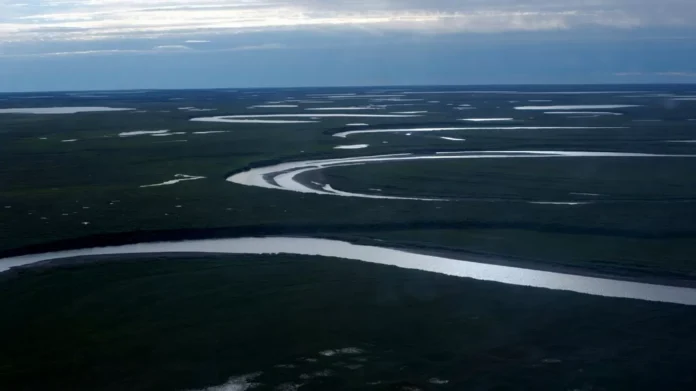The Biden administration has taken a significant step towards protecting the environment by announcing restrictions on drilling and mining activities in Alaska. This decision, made on Friday, will block off 13 million acres of government-owned lands in the Western Arctic from oil and gas drilling. Additionally, the administration is also taking steps to prevent the construction of a mining access road in the same state.
This move comes as a welcome change from the previous administration’s policies, which prioritized profit over the protection of our natural resources. The Biden administration’s decision to restrict drilling and mining activities in Alaska reflects their commitment to addressing the climate crisis and preserving our planet for future generations.
The Western Arctic region is home to diverse and fragile ecosystems, including the Arctic National Wildlife Refuge, which is considered one of the last untouched wilderness areas in the United States. The area also serves as a vital habitat for many wildlife species, including polar bears, caribou, and migratory birds. By restricting drilling and mining activities in this region, the Biden administration is taking a crucial step towards safeguarding these precious habitats.
Not only will this decision have a positive impact on the environment, but it will also protect the traditional lands and ways of life of the Indigenous communities in Alaska. The Gwich’in and Iñupiat people have lived in this region for thousands of years, and their cultures and livelihoods are deeply intertwined with the land. The Biden administration’s decision to restrict drilling and mining activities will help preserve their way of life and protect their rights.
The administration’s announcement also includes plans to block the construction of a mining access road in the Ambler Mining District. This road, if built, would have a devastating impact on the environment and the communities in the region. It would cut through vital caribou migration routes and threaten the water quality of the Kobuk River, which is a crucial source of food and water for the Indigenous communities living in the area. The Biden administration’s decision to prevent the construction of this road is a victory for environmental and Indigenous rights activists who have been fighting against it for years.
Furthermore, this decision aligns with President Biden’s commitment to combat climate change. The oil and gas industry is one of the largest contributors to greenhouse gas emissions, and by restricting drilling in the Western Arctic, the administration is taking a significant step towards reducing our carbon footprint. This move is also in line with the administration’s recent decision to rejoin the Paris Climate Agreement, signaling their dedication to addressing the global climate crisis.
The Biden administration’s decision to restrict drilling and mining activities in Alaska is a significant victory for the environment, Indigenous rights, and the fight against climate change. It sets a precedent for future administrations to prioritize the protection of our natural resources over short-term profits. This decision also reflects the administration’s commitment to working towards a more sustainable and equitable future for all.
However, some critics argue that this move will have negative impacts on the economy and energy independence. But the truth is, we cannot have a healthy economy or energy independence without a healthy environment. The benefits of protecting our natural resources far outweigh any short-term economic gains from drilling and mining activities.
In conclusion, the Biden administration’s decision to restrict drilling and mining activities in Alaska is a significant step towards protecting our planet and addressing the climate crisis. It reflects their commitment to prioritizing the well-being of our environment and Indigenous communities over corporate interests. This decision sends a powerful message that the United States is ready to take bold actions to combat climate change and preserve our planet for future generations. Let us hope that this is just the beginning of many more positive steps towards a more sustainable and equitable future for all.

